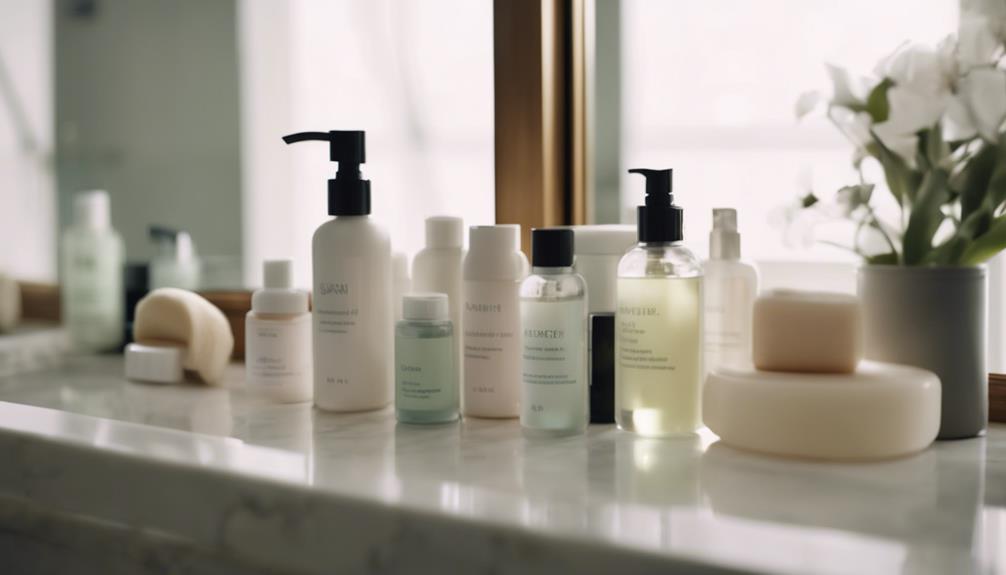During Skin Cancer Awareness Month, it’s important to understand that sun safety isn’t just seasonal — it’s a year-round habit. Protect your skin daily by wearing broad-spectrum SPF 30+ sunscreen, protective clothing, and sunglasses, even on cloudy days. Regularly check your skin for new or changing spots, and schedule annual dermatologist exams. Taking these steps now helps prevent skin cancer and keeps your skin healthy. Continue exploring tips to stay safe throughout the year.
Key Takeaways
- Regular skin screenings by dermatologists are essential for early detection and maintaining skin health year-round.
- Consistent sun protection, including daily sunscreen use and protective clothing, is vital even on cloudy days.
- Recognize changes in moles or skin lesions and seek prompt medical evaluation to catch skin cancer early.
- UV rays can penetrate clouds, making year-round sun safety practices crucial regardless of weather conditions.
- Establishing a routine of sun safety and skin exams during Skin Cancer Awareness Month encourages lifelong healthy habits.

Did you know that early detection of skin cancer can substantially improve your chances of successful treatment? That’s why prioritizing sun safety should be a year-round commitment, not just something you think about in the summer. Taking proactive steps like practicing sun protection and scheduling regular skin screenings can make a huge difference in catching skin cancer early, when it’s most treatable. Sun protection isn’t only about applying sunscreen before heading outdoors; it’s about consistently shielding your skin from harmful UV rays. Wear broad-spectrum sunscreen with at least SPF 30 every day, even on cloudy days, since UV rays can penetrate through the clouds. Donning protective clothing, wide-brimmed hats, and UV-blocking sunglasses adds extra layers of defense, especially during peak sunlight hours. Seeking shade whenever possible also reduces exposure, helping to prevent skin damage over time.
In addition to these daily habits, routine skin screenings are essential. Many skin cancers develop in areas you might not regularly inspect, so seeing a dermatologist for professional skin exams once a year is a smart move. These screenings allow trained professionals to identify suspicious moles or spots that could be early signs of skin cancer. The earlier these lesions are caught, the easier they are to treat, and the less invasive the procedures tend to be. Even if you don’t notice anything unusual, annual skin checks provide peace of mind and help establish a baseline for your skin’s health. If you see any new growths, changes in existing moles, or spots that don’t heal, don’t wait—schedule a skin screening immediately.
Frequently Asked Questions
How Does Skin Cancer Detection Vary Among Different Skin Types?
You should know that skin cancer detection varies among different skin types due to melanin detection differences. People with lighter skin are more prone to visible changes, making early detection easier. In contrast, skin type variations with more melanin can hide symptoms, delaying diagnosis. Recognizing these differences helps you stay vigilant, especially if you have darker skin, so you can seek medical advice promptly and catch issues early.
Are There Specific Sun Safety Tips for Children and Teens?
Protecting your children and teens from the sun is essential. Focus on playground sun safety by applying broad-spectrum sunscreen, encouraging protective clothing, and seeking shade during peak hours. For teen sun protection, promote habits like wearing wide-brimmed hats and sunglasses, avoiding tanning beds, and staying hydrated. By instilling these habits, you help reduce their risk of skin damage and cancer, ensuring they enjoy outdoor activities safely and confidently.
What Are the Latest Advancements in Skin Cancer Treatment Options?
You should know that recent advancements in skin cancer treatment include immunotherapy breakthroughs, which boost your immune system to fight cancer more effectively, and targeted drug development, offering personalized treatments that focus on specific cancer cells. These innovations improve survival rates and reduce side effects. Staying informed about these options helps you make better decisions if skin cancer affects you or loved ones, emphasizing the importance of ongoing research and cutting-edge therapies.
How Can I Tell if a Mole or Skin Spot Is Dangerous?
Think of your skin as a landscape, where moles and skin spots are landmarks. During mole examination and skin spot assessment, look for asymmetry, irregular borders, multiple colors, large diameter, and evolving changes. If a spot looks different from others or changes over time, it might be dangerous. Always consult a dermatologist for professional skin health evaluation, because early detection can save lives and keep your skin safe.
What Are Common Misconceptions About Sun Exposure and Skin Cancer?
Many believe tanning myths, like thinking a base tan prevents burning, which isn’t true. Sunscreen myths also persist; some think it’s only necessary on sunny days, but you need protection every day. You might assume darker skin doesn’t get skin cancer, but it can. Stay informed, wear broad-spectrum sunscreen, seek shade, and avoid peak sun hours. Protecting your skin year-round is essential for long-term health.
Conclusion
Don’t think one month of awareness is enough—sun safety should be a year-round habit. Even if you rarely spend time outdoors, UV rays can still harm your skin. By staying vigilant and practicing simple habits like wearing sunscreen and protective clothing daily, you protect yourself now and later. Remember, taking small steps consistently makes a big difference in preventing skin cancer. Your future self will thank you for making sun safety a permanent part of your life.









